Tamara Nizhnikova, who has died at 92, was a stalwart of the National Opera and Ballet of Belarus.
She earned the Order of the Red Banner of Labour, and was named a People’s Artist of the USSR.
She retired from singing in Brezhnev-era 1976.
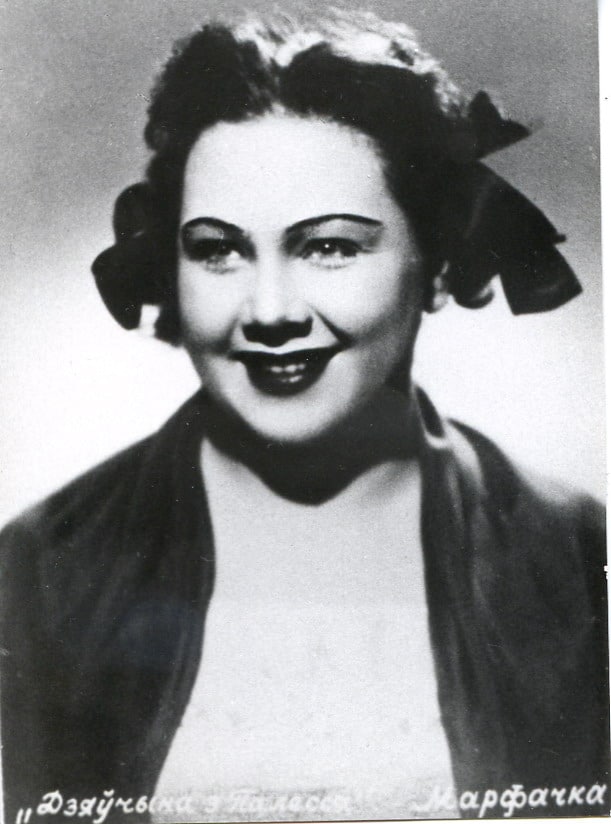
Tamara Nizhnikova, who has died at 92, was a stalwart of the National Opera and Ballet of Belarus.
She earned the Order of the Red Banner of Labour, and was named a People’s Artist of the USSR.
She retired from singing in Brezhnev-era 1976.

The international clarinettist Murray Khouri, a player in the golden age of London orchestras, has written a memoir about some maestros he admired and others he endured. Read on….
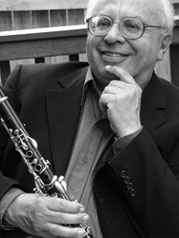
Sitting in the Hot Seat (or Keeping Your Cool)
by Murray Khouri
It’s a cold march morning in London. But in the Royal Festival Hall there is a welcoming warmth and on the stage the London Philharmonic Orchestra (“LPO”) is assembling at full strength ready to rehearse Gustav Mahler’s gigantic 6 th Symphony under legendary conductor George Szell. With tuning completed, Bernard Haitink, the music director, appears with Szell to introduce him and wish him well. Szell replies by saying “I last conducted this orchestra in 1937 and I don’t see any familiar faces,” looking at at least a dozen players who had played under him at that time.
“I want to play this symphony right through and I trust that there won’t be any technical errors”. With these chilling words ringing in our ears, the rehearsal began. True to his word, we played the 80 minute work from beginning to end under his stern piercing gaze, yet never a word spoken. Four rehearsals had been scheduled, a great many at this time. My feeling was that the LPO was currently a better orchestra than he expected, hence the absence of withering criticism. The day before the concert, he stopped, pointing to our first trumpet Gordon Webb. Was he really going to have a go at Gordon Webb? “Mr Webb”, said Szell, “you are the best trumpet player I know of”. The concert was predictably disappointing. An exhausted orchestra was driven hard at the morning rehearsal on the day of the concert, leaving nothing for the evening. Szell made two conducting errors in the Scherzo movement, but had the good grace to jab a finger into his chest, acknowledging that it was his doing.
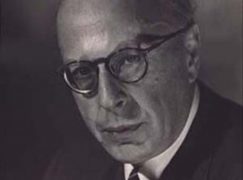
Compare the above with the universally admired Rudolf Kempe, a favourite with most players, including myself. My first encounter with him was at a Beethoven concert with the Royal Philharmonic Orchestra. At the start he seemed curiously detached, simply looking at the tricky moments and at the tempo transitions and concerning himself with balance in the difficult dry acoustic of the Royal Festival Hall. I felt disappointed that there seemed so few insights. How wrong could I have been? The Eroica Symphony that evening was a performance I will never forget. He was a master of psychology, able to unleash all the orchestra’s pent up energy when it really mattered, that is, in the performance. Szell had the kind of technique that demanded absolute precision on the down beat, producing great precision at the expense of warmth of sound, whereas Kempe seemed to beat so little, using the warmth of his demenour and eye contact to produce a superb result. He also had a sense of humour, a quality absent with Szell. Kempe seemed to hear the orchestra from within, never playing “on the ensemble”. After all, he had been a Principal Oboe in Germany before taking up conducting. For me this was the summit of the conductor’s art, in fact, “art concealing art”.
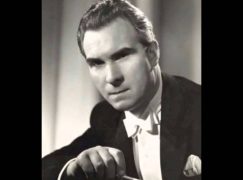
Hungary must have produced more conductors than any other country that I know of. I was looking forward intensely to my first encounter with Georg Solti, having been brought up on his countless Decca recordings. With him, as with Szell, the orchestra was kept in the tightest grip with orchestral soloists bound hand and foot to his baton. It was his constant pressing and aggression that led to Solti as a conductor finally losing me. We were rehearsing Bruckner’s 8 th Symphony, a glorious work with its vast cathedral like sounds. To the brass section, “smash it, smash it”, he exhorted, producing a predictably raucous result. He simply couldn’t let the orchestra breathe and relax when the music called for it. Both Solti and Szell were pianists, whereas Kempe had been a Principal Oboe. They played on the orchestra like a keyboard, exactly the opposite of Beecham or Boult. ‘Elegance’ was a word absent from Solti’s vocabulary. Many, like me, found his baton technique wanting. All the time exhorting the strings to press harder, the opposite of Leopold Stokowski, with his penchant for ‘free bowing’. When we played the Mahler Symphonies with Solti, I felt physically sick at the unrelenting driving force, with one climax piled on after the other, until one was exhausted at the lack of repose.
It is probably a good moment to introduce that old magician into this account. Leopold Stokowski came to conduct the Royal College of Music (“RCM”) Symphony Orchestra when I was a student there. I could not believe he really was there, this living legend, famous because of his work with the Philadelphia Orchestra and the star of Disney’s Fantasia. We crowded around him, successfully getting his autograph which I treasure to this day. Then we started to rehearse Brahms’s Second Symphony. He stopped twice: the first time, to say to our First Horn, ‘Bravo, First Horn, that is a real waldhorn sound’. Then he turned to me, when I had a clarinet solo, to say ‘See frescoes around the Concert Hall? Your solos must stand out like that, in high relief’. And miracles of miracles, it wasn’t long before the RCM Symphony Orchestra took on the Stokowski sound. He was absolutely hypnotic, saying all the times to the String Section: “Free bowing, free bowing!”. All of which leads to answering the question: “What does it take to be a great conductor?” At its best, it is drawing the sound out of the players, the score in his head, not the head in his score. He didn’t beat time in the literal sense, rather, getting all the players to take responsibility for the end result, with him standing there, moulding and shaping the music. Another way of putting it is the ‘man on the podium is the conduit to the composer’s wishes, all the sounds passing through the one man’. There are of course many takes of Stokowski’s mannerisms: his affair with Greta Garbo and his curiously accented English pronunciation. After all, he grew up in London, going to America in his early 20s. And, driving past Big Ben in the Houses of Parliament, he drawled: ‘What name, big clock?’
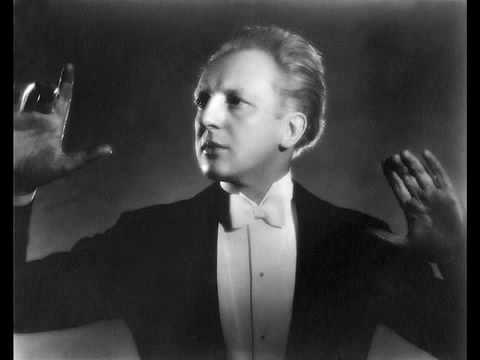
Although they were quite different personalities, Sir Adrian Boult and Stokowski, in conducting technique, had many similarities. Boult’s relaxed fluid stick control was not rigid, giving the orchestra ample room to breathe. My first outing with Sir Adrian was in Elgar’s Second Symphony. There seemed to be no help from the podium, with everyone left to fend for themselves. I was quickly cautioned, “Don’t look”, and once I just sat there and played, all was well. In the many concerts I played with him, none were more memorable than with the Elgar works especially the Second Symphony. His knowledge and advice were truly inspirational. ‘Take out the bar lines’ and ‘swing it’ were popular phrases. During the 1950s and 1960s he was the LPO’s music director and he had his detractors. A story related to me concerns a visit to Russia in the early 1960s. In the grand hall of the Moscow conservatory, playing a Tchaikovsky Symphony, he was heard to say, ‘Change gear here. Double the clutch now and then slam on the dust bin lid’. I can’t imagine what the Russians thought of that. He rode the wave of the British musical renaissance giving great performances of Vaughan Williams’ Holst, Elgar, Stanford, Parry and many others. His seemingly impassive exterior concealed a bad temper and great depth of feeling. He stood tall and erect on the podium, feet firmly in one place. Not for him Leonard Bernstein’s dancing all over the place.
Of all the regular conductors there remains Bernard Haitink. I played in his first ever English concert, a performance of Mahler’s Fourth Symphony and found him sober and dull. How wrong I was. His gradual development bore rich fruit. He was exactly at opposite poles to Solti and his cycles of Mahler and Bruckner were, in my opinion, the best. His signature work was Mahler’s Third Symphony. Its primitive child-like elements were beautifully drawn and as the finale reached its climax, one saw him break down in tears. The magical off-stage post-horn solo arrived like a messenger from heaven. And just like Otto Klemperer, he had a rock solid ability to finish his symphony over a long span, ending the work without uncalled for tempo variation. He headed an enviable list of conductors appearing with the LPO: Karel Ancerl, Walter Susskind, Jean Martinon, Evgeny Svetlanov and Eugen Jochum, to list but a few. It was also a demonstration of Haitink’s generosity of spirit that he welcomed these distinguished colleagues.
I had become useful at the BBC both in sound and television and it was with the BBC Symphony Orchestra that I first came into contact with Pierre Boulez, quite an event. There seemed now to be two basic schools of conducting. One I will call “interventionist”, the other “non-interventionist”. Boulez had the most acute hearing of anyone in the business and at first he seemed to do very little other than beat time. We were playing Webern’s 6 Pieces for Large Orchestra (Op.6), when in the middle of one of the great climaxes, he stopped and said to the Third Trombone ‘You’re too sharp’.
And just to show he wasn’t a cold fish, at the climax of the dawn music of Ravel’s Daphnis et Chloe, he suddenly threw one arm across his chest in a moment of deep emotion. Playing some of the more chamber-like pieces such as Messiaen’s Oiseaux Exotiques and the Webern Songs, he required each instrumentalist to play his part alone before he would begin. He had made friends with Otto Klemperer and the two had much in common. There was a certain belief in the “neue sachlichkeit” (“new objectivity”), the opposite from conductors like Bruno Walter and Wilhelm Furtwangler. Boulez’s scores were models of pristine clarity making him the epitome of the composer/conductor.
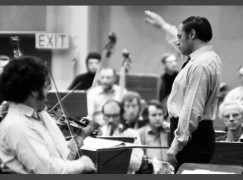
Time to mention other conductors with whom I was associated from time to time. It is a long list, some names are illustrious, some less so. Antal Dorati did excellent work with both the London Symphony Orchestra and the London Philharmonic and together with Neville Mariner, is the most recorded of all London conductors. A pugnacious man who once caught a second violinist reading a book during a recording session, tried to flee the hall, only to find all the doors were locked. He was forced to sheepishly remount the podium and resume recording. Then there was Walter Susskind, complete with toupee, built-up shoes and facial make-up, but a conductor of vast experience very much at home with Czech music, the music of his homeland.
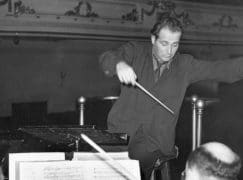
We saw a lot of John Pritchard, witty and urbane, who could be relied upon to do a professional job under all conditions. His visit to Australia was marred by a Sydney Opera House official who barred him entry to the building. ‘Never heard of you,’ was the remark. So Sir John Pritchard retired to a nearby restaurant and after frantic searching was finally found enjoying an elegant dinner. The performance finally took place almost an hour late. The Glyndebourne Opera took up much of his time, where he delivered polished performances of the Mozart operas.
I never had the opportunity of playing under Sir Malcolm Sergeant as he died soon after I entered the profession. He was heartily disliked by most orchestral players because of his patronising attitude towards the band. But he was capable of delivering outstanding performances of choral works, though in corrupt performing editions. One occasion he was greeted after a performance by a lady mayor who said, ‘Sir Malcolm, if I pluck your carnation, will your blush?’ To which he replied, ‘Madam, if I pull your chain, will you really flush?’. He showed great courage right the end, rising from his death bed to greet the BBC Promenaders one last time.
Then there was Raymond Leppard, whose tirades against the musical establishment resulted in his emigration to the United States. His performances of Monteverdi and Cavalli established new standards in this repertoire. Leonard Bernstein had visited London in the early 1950s to conduct the London Philharmonic Orchestra. He was deeply shocked by the drabness of the city and the working conditions of the musicians. Bernstein of course was a great composer/conductor, but for enjoyment, a tour with William Walton conducting his own works was unforgettable. He had no pretensions as a conductor but knew how his works should go with everything taken at a cracking pace. It remains in my memory, the opening of the violin concerto and the thrilling climax of Belshazzar’s Feast. Malcolm Arnold appeared from time to time and was hugely popular with everyone. His ebullient manner masked a very troubled man: in later years he was notoriously unreliable but works like “The Tam o’ Shanter Overture (Op. 51) and his Symphony No. 2 (Op. 40) have stuck in the repertoire as indeed they should.
I would like to sum up with some observations about the art of musical direction which we call conducting. The days of the tyrannical conductor have gone. There are no Fritz Reiners or George Szells to be found. And if it were not for Toscanini’s genius, orchestral players would not have tolerated his temper tantrums. The nature of orchestral players has changed. Both sexes are to be found, generally. There is also a better interaction between conductor and players. The Abbados and Rattles don’t have to raise their voice to get a superlative result. They signal a new era in the art of orchestral performance.
Murray Khouri
The Hungarian conductor has created a new company with his Budapest Festival Orchestra to present opera in Vicenza, starting this October.
Falstaff will be the one production in 2018. Next year there will be two, and rising.
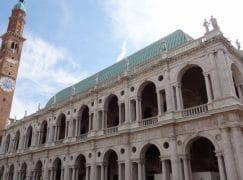
The 2018 awards for US and Canadian singers have just concluded.
The big winners are:
GEORGE LONDON AWARDS ($10,000 each):
Lawson Anderson, bass-baritone (31, Atlanta, GA) – George London Award in memory of Kirsten Flagstad, sponsored by the New York Community Trust
Raehann Bryce-Davis, mezzo-soprano (31, Keene, TX) – George London Award
Rihab Chaieb, mezzo-soprano (30, Montreal, Quebec) – George London Award for a Canadian singer, sponsored by Marjorie Laughery
Emily D’Angelo, mezzo-soprano (23, Toronto, Ontario) – George London Award in memory of Leonie Rysanek
Lauren Margison, soprano (25, Toronto, Ontario) – George London Award sponsored by Lloyd E. Rigler – Lawrence E. Deutsch Foundation
Benjamin Taylor, baritone (29, Waldorf, MD) – George London Award
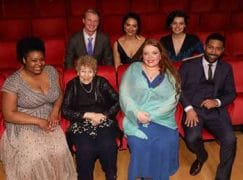
The Australian pilot David Tong, who died in a crash in December, had once been a star pianist at Juilliard, where he held the Vladimir Horowitz scholarship.
Friends led by oboist Liang Wang, principal oboe of the New York Philharmonic, will perform a Memorial Gala Concert Goodbye To TONG on Thursday, February 22, 2018 at 4:00 pm in New York City; @ Church of the Blessed Sacrament, 152 W 71st St, New York, NY 10023.

The service is being coordinated by one of David Tong’s best friends, Junsik Park, who runs JSAC New York, an arts consulting company.
One of the most famous guitar makers faces bankruptcy after 116 plucking years.

It is still making a billion dollars this year.
Read here.
Somehow omitted from my Spectator interview with Jonas…
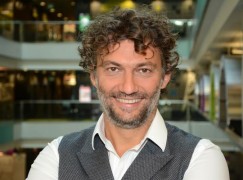
it’s Forza del Destino.
On BBC Radio 4 this morning, Chi-chi Nwanoku thanked Slipped Disc for help towards the recovery of her double-bass bow, which she had left on the London Underground.
Tonight, we hear that Ophélie Gaillard, whose Gofriller cello was taken from her at knifepoint on Thursday, has been reunited with the instrument.
Apparently, it was left close to her house in a battered stolen car.
She received an anonymous call and was told to look outside.
Ophélie says: ‘Merci merci merci!!!!!! à chacun d’avoir partagé mon post, d’avoir contribué à diffuser l’information et donné vos conseils précieux.’
Happy to oblige.
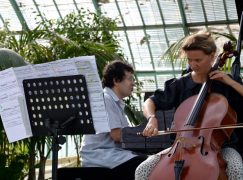
From the Lebrecht Album of the Week:
Some 15 years ago I was asked by one of the London orchestras to curate a series titled Other Russia, looking at the composers who fell or were pushed off the wayside under the Soviet Union. We were going to focus on the likes of Karamanov, Kancheli, Knaifel, Roslavets, Tishchenko, Ustvolskaya, Firsova and more. The scheme hit a brick wall when prominent conductors balked at unfamiliar repertoire and the orchestra feared a box-office frost, but it was a worthwhile exercise and one that some braver spirits should still take up.
Among the names I omitted out of ignorance was the remarkable Fridrich Bruk…
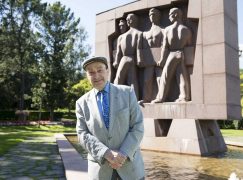
Read on here.
And here.
The soprano, who has taken a lively interest in neuroscience, has been speaking on a Stanford Medicine podcast.
During our conversation we talked about the healing power of music, and I asked whether her voice ever heals her. “That’s an interesting question,” she responded. “I think singing, definitely, and music in general has a huge power over me. When I sing the four last songs of Richard Strauss – which I’ve sung more than anything in my repertoire – in the last piece, I am in a meditative state. My breathing slows down. I can suddenly lift of out of my daily life, and that happens every time. I would say ‘yes’ is the answer to that.”
Listen to the full podcast here.

This is a new one, by Oded Zehavi, conducted from the mandolin…
And here’s another one, just sent in:
Handel’s Ariodante has never been done before at the Vienna Opera, so it makes sense that most of the singers are either on debut or role debut in Sir David McVicar’s production.
Dame Sarah Connolly sings the title role, her first in the house.
Chen Reiss, a Vienna regular, sings her first Ginevra.
Christophe Dumaux makes his Staatsoper debut as Polinesso.
Wilhelm Schwinghammer is on debut as King.
Hila Fahima sings Dalinda.
William Christie conducts, another debutant.
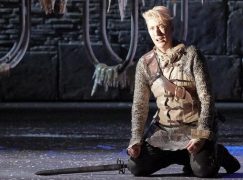
Sarah Connolly as Ariodante, photo © Wiener Staatsoper / Michael Pöhn